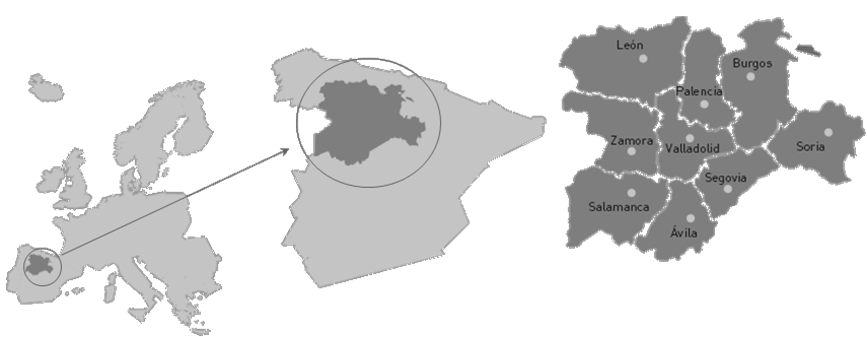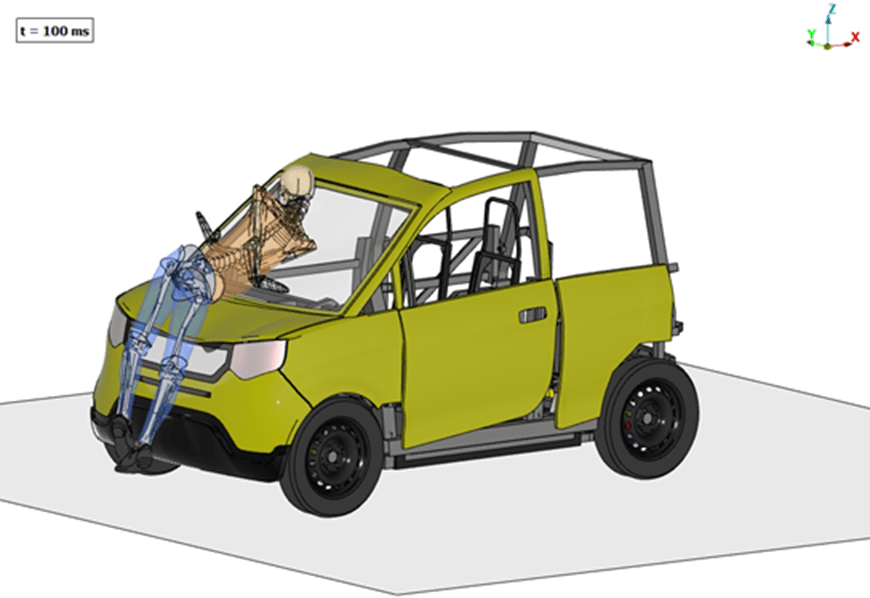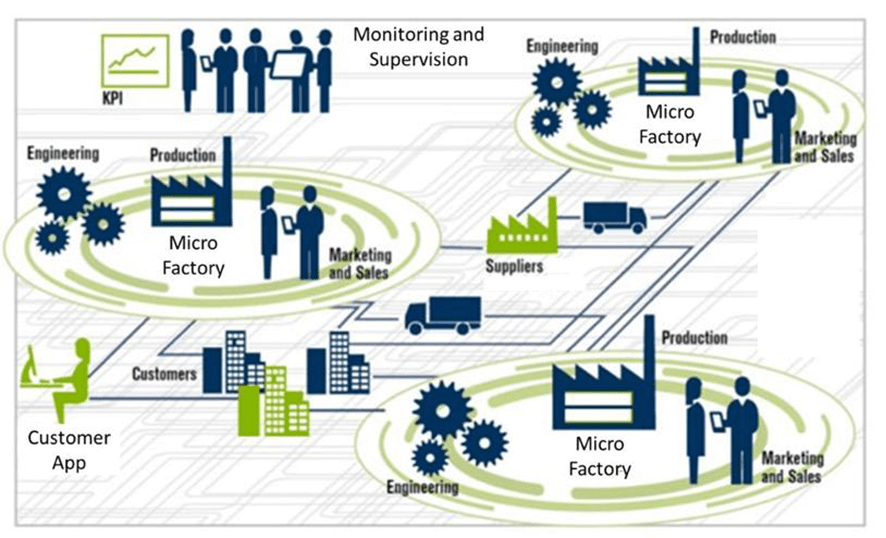by cidaut | Apr 13, 2021 | MOBILITY
Cidaut is making a detailed analysis of the automotive value chain in Castilla y León region to determine the viability of a micro-factory to assemble urban electric vehicles based on the principle of kilometer zero production. The analysis encompasses companies of different sizes from Original Equipment Manufacturers (OEMs) to Small and Medium Enterprises (SMEs) going through suppliers of different levels (TIER 1, TIER 2, …). Although the analysis is still ongoing, as a preliminary conclusion it can be highlighted the strength of the automotive value change in the region, covering a high percentage of the components production needs. This production capability is complemented by the existence of Research and Development departments in many of the providers analyzed, the presence in the region of high skilled Technological Center in the automotive sector and the contribution of several Universities with high experience in mechanics, electronics and communication.

The local production minimizes the transport of the components from the manufacturing site to the assembly plant, reducing the noxious emissions in the manufacturing phase. This effect is complemented in the use phase due to the fact that the vehicle vehicles to be produced are small urban vehicles, optimized to reduce their energy consumption and equipped with photovoltaic panels that allow to increase the daily range by 20 kms a day, as an average along the year.
The scope of this project is not only regional but European. In the frame of the Avangard Project, funded by the European Commission in the Horizon 2020 Programme, Cidaut leads the activities related to the analysis of different European regions where the installation of the micro-factories would have a larger impact in the reduction of the environmental impact, the creation of job, the enhancement of the automotive value chain and the benefits for the society. The regions under study are located in the following countries: Finland, Greece, Italy, Poland and Portugal.
by cidaut | Feb 18, 2021 | Materials, MOBILITY, SAFETY
In the frame of Multi-Moby European Project, which aims at developing of technology for safe, efficient and affordable urban electric vehicle, Cidaut is responsible of the integral safety of the vehicle’s occupant but also of the rest of the vulnerable road users.

Multi-Moby is the last, by now, of a large row of projects that were born from the idea of developing environmental friendly, sustainable vehicles considering circular economy concepts, and will finish with the development of a digitalized micro-factory for the assembly of the final solution. In this project the vehicle safety is being improved that’s to the introduction of automated driving solutions that will contribute to increase the integral safety of occupants and the rest of road users.
Cidaut is in charge of the structural design, the development of the restraint system and the implementation of innovative solutions for vulnerable road users’ protection, all of them supported by the automated driving capabilities of the vehicle. The vehicle will be equipped with artificial intelligence to look out the environment and make decisions to avoid or mitigate the possible accident. In the worst case, if the accident happens, Cidaut’s solutions will minimize its consequences on both, the occupant and the vulnerable road users.
Acknowledgment
The research leading to these results received funding from the European Union (EU) project MULTI-MOBY (GA #101006953).
by cidaut | Feb 17, 2021 | MOBILITY, Sin categoría
Cidaut is involved in Avangard project whose main objective is to develop advanced manufacturing solutions tightly aligned with business needs and oriented to the assembly of electric urban vehicles: 4 passengers’ cars, vans and bicycles. To achieve this ambitious target some innovative solutions are been applied both in the physical and digital ambit. From the physical point of view robotized integration of laser cutting-shaping –welding for 3D components, supersonic deposition of metallic powders for high speed 3D printing and large volume and high-speed 3D polymeric printing are the most relevant solutions.

But today’s article aims to focus the attention on the digital solutions. Avangard pretends to digitalize the whole manufacturing and delivery process. From an electronic device, the client will be able to configure the vehicle, make the purchase order and follow the evolution of the vehicle manufacturing, assembly and delivery. At the same time, the manufacturing system is able to receive the order and decide the most suitable microfactory of the system to manufacture this vehicle attending to location, work load, availability of goods and environmental impact.
To warranty the security, privacy and authenticity of the whole process it is needed, among others, the application of blockchain solutions, that are being developed ad-hoc for Avangard project. The infrastructure of the complete system is based on IoT (Internet of Things) solutions. Despite the large advances in the last decades, centralized cloud services are vulnerable to security attacks.
The solution precludes the use of trustzone-based architecture to support cryptographic operations and tamper-proof memory for the secure storage of sensitive data. Thus RFID/NFC can provide a unique identity to the connected devices to warranty trustiness and tracking through the blockchain. Immutability technologies are used to generate real-time access control, restricting connection only to authorized devices to warranty the privacy of the system.
Acknowledgment
The research leading to these results received funding from the European Union (EU) project AVANGARD (GA #869986).
by cidaut | Dec 14, 2020 | MOBILITY
The aim of Avangard is to design a microfactory for the production of electric cars and bikes applying Industry 4.0 solutions and minimizing the footprint of both the production and use phase of the vehicles. After the first third of this three years project, the first prototypes of electric cars have been produced and the bicycles will come soon. Taking advantage of the modularity of the vehicle design, the prototypes correspond to different configurations: two standard four seat vehicles and two vans have been manufactured, in the case of the four seats vehicles one of them corresponds to the short length one, while the other is track extended. In the case of the vans the difference among them is the installation of photovoltaic panels in the external surface of one of them, which allows 20 additional kilometres range thanks to the solar irradiation.

The microfactory will need tenth the extension and the investment of a standard factory for vehicles’ production. To reach this ambitious target several innovations are applied that cover from the possibility to make the configuration and the order of the vehicle from an application in your smartphone to the implementation of revolutionary laser cutting and 3D printing solutions. The microfactory has been sized for the production of 50 vehicles a day in two shifts, and is fed by renewable energy in order to be energy independent.
Avangard is linked to Steel S4 EV project, where the design of the vehicles has been optimised to be easily manufactured and at the same time to be best in class at occupant protection. Three of the first prototypes will be tested by Cidaut in the ambit of Steel S4 EV project to validate the frontal and lateral crash behaviour of the vehicles.
by cidaut | Dec 14, 2020 | Energy, MOBILITY
On Tuesday, October 20, 2020, “miciudadatodogas initiative”, together with the León City Council, organized the conference “Renewable Gas, Mobility and Sustainable Development”. This conference was followed in online format by more than 70 attendees related to natural and renewable gas.

On behalf of CIDAUT, researcher José Ignacio Domínguez took part in the 2nd Roundtable “Renewable Gases and the promotion of the development of a just transition strategy” where he commented on the opportunities in mobility with renewable hydrogen in Castilla y León. During the event, low-carbon economy projects and initiatives were announced that, in addition to contributing to the decarbonization process, also collaborate in the deployment of the Spanish just transition strategy.
This event also allow the attendees to learn about the new sustainable mobility strategy that the Ministry of Transport, Mobility and Urban Agenda is promoting at national level, as well as the policies that are being developed in this matter by Junta de Castilla y León and the City Council of León.
miciudadatodogas is a public-private initiative, involving companies related to natural and renewable gas and sustainable cities committed to the circular economy and the fight against climate change.
Page 6 of 6« First«...23456




